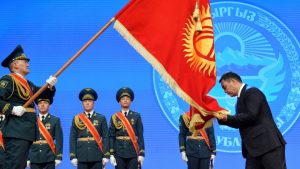This week, the Kyrgyz parliament is expected to greenlight a referendum on a new constitution. The draft has drawn sharp critique from expected corners, while the mainstream assumption is the referendum will go ahead as envisioned.
The draft constitution was finally made public on February 9 when it was introduced to parliament, with public discussion to run until March 9. The plan is for the constitutional referendum — asking the question: “Do you support the draft of the new constitution, yes or no?” — to run in tandem with scheduled local council elections on April 11.
The current draft is a revised version of the “Khanstitution” floated in November 2020, though it retains many aspects human rights advocates found problematic. Even President Sadyr Japarov admitted the draft was far from perfect, commenting in February that parliament has an opportunity to correct its shortcomings before sending it for referendum. On March 2, 24.kg reported that a parliamentary committee approved a new draft but it appears that the updated version has not been made public.
Human Rights Watch urged the Kyrgyz government to postpone consideration of a new constitution until after a new parliament has been elected, referring to the current parliament as a “caretaker parliament.”
The mandates of the current Kyrgyz parliament were set to expire in October 2020. That month’s botched parliamentary election — triggering the current political crisis — saw the body remain in its seats as Sadyr Japarov unexpectedly rose to power. In November 2020, in response to a request for review from the Kyrgyz Supreme Court’s Constitutional Chamber, the Council of Europe’s Venice Commission, an advisory body made up of constitutional law experts, made clear that any parliament outlasting its mandate should only act to keep the government running, not fiddle with its constitutional bones. In its conclusion, the commission stated that “except for punctual and technical reform necessary” to organized new elections “any other constitutional reform cannot be initiated after the postponement of the regular elections.” The Kyrgyz Supreme Court’s Constitutional Chamber promptly ignored the commission’s advice, approving the delay until 2021 of parliamentary elections. They’re expected by June, but that’s not for certain.
Meanwhile, Japarov made no secret of his disdain for the parliamentary system, urging Kyrgyzstan to revert back to a presidential system of government. His desire made tangible progress with his election on January 10, which included a first referendum on the kind of government Kyrgyz want (a presidential system was overwhelmingly approved, though critics note the election’s low turnout).
This puts the upcoming referendum on potentially shaky ground, with it easy to imagine some future Kyrgyz leader (post-Japarov, of course) lambasting it as a process put in motion by an illegitimate parliament on behalf of a criminal president.
Nevertheless, it looks likely that the new constitution will be adopted in April.
Human Rights Watch drew attention to aspects of the draft human rights advocates find especially problematic, particularly the erosion of the system of checks and balances between the executive and legislative branches. Under the draft constitution, the president would gain what once was parliament’s exclusive power to initiate new laws, appoint cabinet ministers, and appoint and dismiss judges, the prosecutor general, the National Bank chair as well as half of the Central Election Commission.
Articles 76 and 70 in the draft constitution, HRW noted, would “make it possible for the president to indirectly recall the mandates of members of parliament, although a separate law would be needed to clarify this.”
The draft also would create a national Kurultai, “a traditional people’s council with delegates from all regions of the country,” which would functionally duplicate parliament, given that the body could suggest removing ministers, nominate representatives to the body that appoints judges, and propose laws to parliament.
Other provisions are inimical to human rights standards, HRW says. For example, article 10, ostensibly to protect children, would prohibit “activities, public events, and dissemination of information contrary to ‘moral values and the public consciousness of the people of Kyrgyzstan.’” Another article includes requirements that advance permission be obtained to hold peaceful assemblies and others would institute greater reporting burdens on NGOs.

































